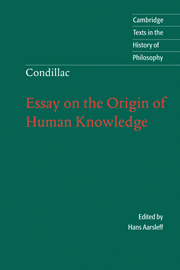Book contents
- Frontmatter
- Contents
- Acknowledgments
- List of abbreviations
- Introduction
- Chronology
- Further reading
- Note on the text and translation
- Essay on the Origin of Human Knowledge
- Introduction
- PART I The materials of our knowledge and especially the operations of the soul
- Section 1
- Section 2 Analysis and generation of the operations of the soul
- Section 3 Simple and complex ideas
- Section 4
- Section 5 Abstractions
- Section 6 Some judgments that have been erroneously attributed to the mind, or the solution of a metaphysical problem
- PART II Language and method
- Index
- Cambridge texts in the history of philosophy
Section 1
Published online by Cambridge University Press: 05 June 2012
- Frontmatter
- Contents
- Acknowledgments
- List of abbreviations
- Introduction
- Chronology
- Further reading
- Note on the text and translation
- Essay on the Origin of Human Knowledge
- Introduction
- PART I The materials of our knowledge and especially the operations of the soul
- Section 1
- Section 2 Analysis and generation of the operations of the soul
- Section 3 Simple and complex ideas
- Section 4
- Section 5 Abstractions
- Section 6 Some judgments that have been erroneously attributed to the mind, or the solution of a metaphysical problem
- PART II Language and method
- Index
- Cambridge texts in the history of philosophy
Summary
§I Whether we raise ourselves, to speak metaphorically, into the heavens or descend into the abyss, we do not go beyond ourselves; and we never perceive anything but our own thought. Whatever the knowledge we have, if we wish to trace it to its origin, we will in the end arrive at a first simple thought, which has been the object of the second, which has been the object of the third, and so on. It is this order of thoughts we must explore if we wish to know the ideas we have of things.
§2 It would be useless to inquire into the nature of our thoughts. The first reflection on oneself is enough to convince us that we have no means of conducting that inquiry. We are conscious of our thought; we distinguish it perfectly from all that it is not; we even distinguish among all our thoughts, each from every other, and that is sufficient. If we stray from that, we stray from something that we know so clearly that it cannot lead us into any error.
§3 Let us consider a man at the first moment of his existence. His soul first has different sensations, such as light, colors, pain, pleasure, motion, rest – those are his first thoughts.
- Type
- Chapter
- Information
- Condillac: Essay on the Origin of Human Knowledge , pp. 11 - 18Publisher: Cambridge University PressPrint publication year: 2001

